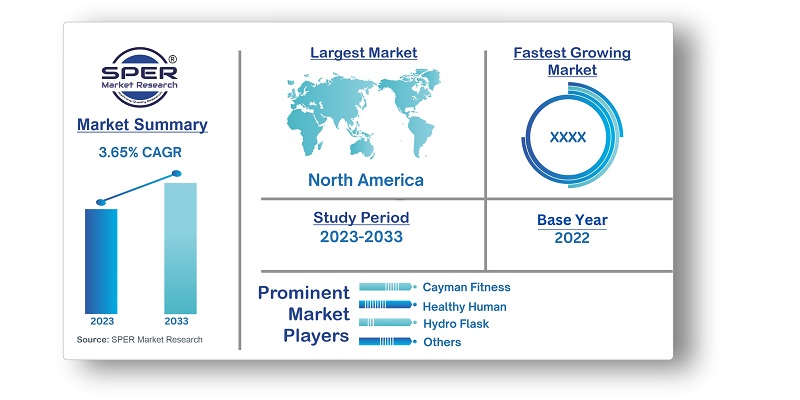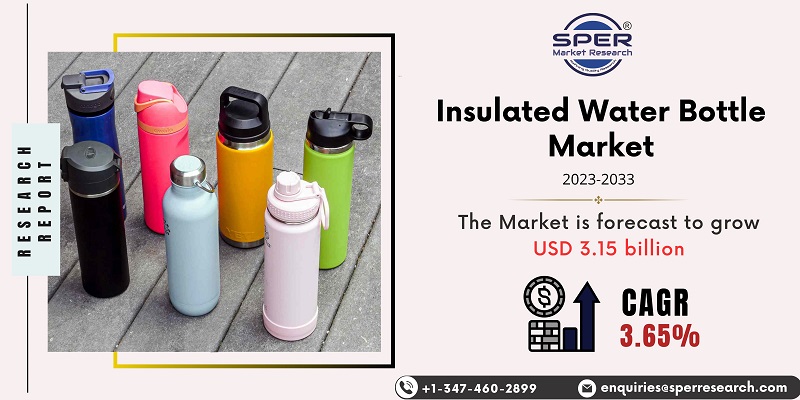
Insulated Water Bottle Market Growth, Size, Trends, Demand, Revenue, Share and Future Outlook
Insulated Water Bottle Market Size- By Type, By Application, By Distribution Channel- Regional Outlook, Competitive Strategies and Segment Forecast to 2033
| Published: Nov-2023 | Report ID: FMCG23140 | Pages: 1 - 216 | Formats*: |
| Category : Consumer & Retail | |||


| Report Metric | Details |
| Market size available for years | 2019-2033 |
| Base year considered | 2022 |
| Forecast period | 2023-2033 |
| Segments covered | By Type, By Application, By Distribution Channel |
| Regions covered | North America, Asia-Pacific, Latin America, Middle East & Africa and Europe |
| Companies Covered | Cayman Fitness, Fnova, Geysa, Healthy Human, Hydro Flask, Ice Shaker, Mira, Rehydrate-Pro, Thermos, Others |
- Office Professionals
- Students
- Commute and Travel
- Parents and Families
- Health and Wellness Seekers
- Corporate and Promotional Gifts
- Others
| By Type: |
|
| By Application: |
|
| By Distribution Channel: |
|
- Global Insulated Water Bottle Market Size (FY’2023-FY’2033)
- Overview of Global Insulated Water Bottle Market
- Segmentation of Global Insulated Water Bottle Market By Type (Big Mouth, Fine Mouth, Mugs, Tumblers)
- Segmentation of Global Insulated Water Bottle Market By Application (Everyday Carry, Home Use, Office, Outdoor Activities, Sports, Travel)
- Segmentation of Global Insulated Water Bottle Market By Distribution Channel (Online Stores, Specialty Stores, Supermarkets/Hypermarkets, Others)
- Statistical Snap of Global Insulated Water Bottle Market
- Expansion Analysis of Global Insulated Water Bottle Market
- Problems and Obstacles in Global Insulated Water Bottle Market
- Competitive Landscape in the Global Insulated Water Bottle Market
- Impact of COVID-19 and Demonetization on Global Insulated Water Bottle Market
- Details on Current Investment in Global Insulated Water Bottle Market
- Competitive Analysis of Global Insulated Water Bottle Market
- Prominent Players in the Global Insulated Water Bottle Market
- SWOT Analysis of Global Insulated Water Bottle Market
- Global Insulated Water Bottle Market Future Outlook and Projections (FY’2023-FY’2033)
- Recommendations from Analyst
1.1. Scope of the report1.2. Market segment analysis
2.1. Research data source2.1.1. Secondary Data2.1.2. Primary Data2.1.3. SPER’s internal database2.1.4. Premium insight from KOL’s2.2. Market size estimation2.2.1. Top-down and Bottom-up approach2.3. Data triangulation
4.1. Driver, Restraint, Opportunity and Challenges analysis4.1.1. Drivers4.1.2. Restraints4.1.3. Opportunities4.1.4. Challenges4.2. COVID-19 Impacts of the Global Insulated Water Bottle Market
5.1. SWOT Analysis5.1.1. Strengths5.1.2. Weaknesses5.1.3. Opportunities5.1.4. Threats5.2. PESTEL Analysis5.2.1. Political Landscape5.2.2. Economic Landscape5.2.3. Social Landscape5.2.4. Technological Landscape5.2.5. Environmental Landscape5.2.6. Legal Landscape5.3. PORTER’s Five Forces5.3.1. Bargaining power of suppliers5.3.2. Bargaining power of buyers5.3.3. Threat of Substitute5.3.4. Threat of new entrant5.3.5. Competitive rivalry5.4. Heat Map Analysis
6.1. Global Insulated Water Bottle Market Manufacturing Base Distribution, Sales Area, Product Type6.2. Mergers & Acquisitions, Partnerships, Product Launch, and Collaboration in Global Insulated Water Bottle Market
7.1. Global Insulated Water Bottle Market Value Share and Forecast, By Type, 2023-20337.2. Big Mouth7.3. Fine Mouth7.4. Mugs7.5. Tumblers
8.1. Global Insulated Water Bottle Market Value Share and Forecast, By Application, 2023-20338.2. Everyday Carry8.3. Home Use8.4. Office8.5. Outdoor Activities8.6. Sports8.7. Travel
9.1. Global Insulated Water Bottle Market Value Share and Forecast, By Distribution Channel, 2023-20339.2. Online Stores9.3. Specialty Stores9.4. Supermarkets/Hypermarkets9.5. Others
10.1. Global Insulated Water Bottle Market Size and Market Share
11.1. Global Insulated Water Bottle Market Size and Market Share By Type (2019-2026)11.2. Global Insulated Water Bottle Market Size and Market Share By Type (2027-2033)
12.1. Global Insulated Water Bottle Market Size and Market Share By Application (2019-2026)12.2. Global Insulated Water Bottle Market Size and Market Share By Application (2027-2033)
13.1. Global Insulated Water Bottle Market Size and Market Share By Distribution Channel (2019-2026)13.2. Global Insulated Water Bottle Market Size and Market Share By Distribution Channel (2027-2033)
14.1. Global Insulated Water Bottle Market Size and Market Share By Region (2019-2026)14.2. Global Insulated Water Bottle Market Size and Market Share By Region (2027-2033)14.3. Asia-Pacific14.3.1. Australia14.3.2. China14.3.3. India14.3.4. Japan14.3.5. South Korea14.3.6. Rest of Asia-Pacific14.4. Europe14.4.1. France14.4.2. Germany14.4.3. Italy14.4.4. Spain14.4.5. United Kingdom14.4.6. Rest of Europe14.5. Middle East and Africa14.5.1. Kingdom of Saudi Arabia14.5.2. United Arab Emirates14.5.3. Rest of Middle East & Africa14.6. North America14.6.1. Canada14.6.2. Mexico14.6.3. United States14.7. Latin America14.7.1. Argentina14.7.2. Brazil14.7.3. Rest of Latin America
15.1. Cayman Fitness15.1.1. Company details15.1.2. Financial outlook15.1.3. Product summary15.1.4. Recent developments15.2. Fnova15.2.1. Company details15.2.2. Financial outlook15.2.3. Product summary15.2.4. Recent developments15.3. Geysa15.3.1. Company details15.3.2. Financial outlook15.3.3. Product summary15.3.4. Recent developments15.4. Healthy Human15.4.1. Company details15.4.2. Financial outlook15.4.3. Product summary15.4.4. Recent developments15.5. Hydro Flask15.5.1. Company details15.5.2. Financial outlook15.5.3. Product summary15.5.4. Recent developments15.6. Ice Shaker15.6.1. Company details15.6.2. Financial outlook15.6.3. Product summary15.6.4. Recent developments15.7. Mira15.7.1. Company details15.7.2. Financial outlook15.7.3. Product summary15.7.4. Recent developments15.8. Rehydrate-Pro15.8.1. Company details15.8.2. Financial outlook15.8.3. Product summary15.8.4. Recent developments15.9. Thermos15.9.1. Company details15.9.2. Financial outlook15.9.3. Product summary15.9.4. Recent developments15.10. Others
SPER Market Research’s methodology uses great emphasis on primary research to ensure that the market intelligence insights are up to date, reliable and accurate. Primary interviews are done with players involved in each phase of a supply chain to analyze the market forecasting. The secondary research method is used to help you fully understand how the future markets and the spending patterns look likes.
The report is based on in-depth qualitative and quantitative analysis of the Product Market. The quantitative analysis involves the application of various projection and sampling techniques. The qualitative analysis involves primary interviews, surveys, and vendor briefings. The data gathered as a result of these processes are validated through experts opinion. Our research methodology entails an ideal mixture of primary and secondary initiatives.



Frequently Asked Questions About This Report
PLACE AN ORDER
Year End Discount
Sample Report
Pre-Purchase Inquiry
NEED CUSTOMIZATION?
Request CustomizationCALL OR EMAIL US
100% Secure Payment






Related Reports
Our Global Clients
Our data-driven insights have influenced the strategy of 200+ reputed companies across the globe.




















